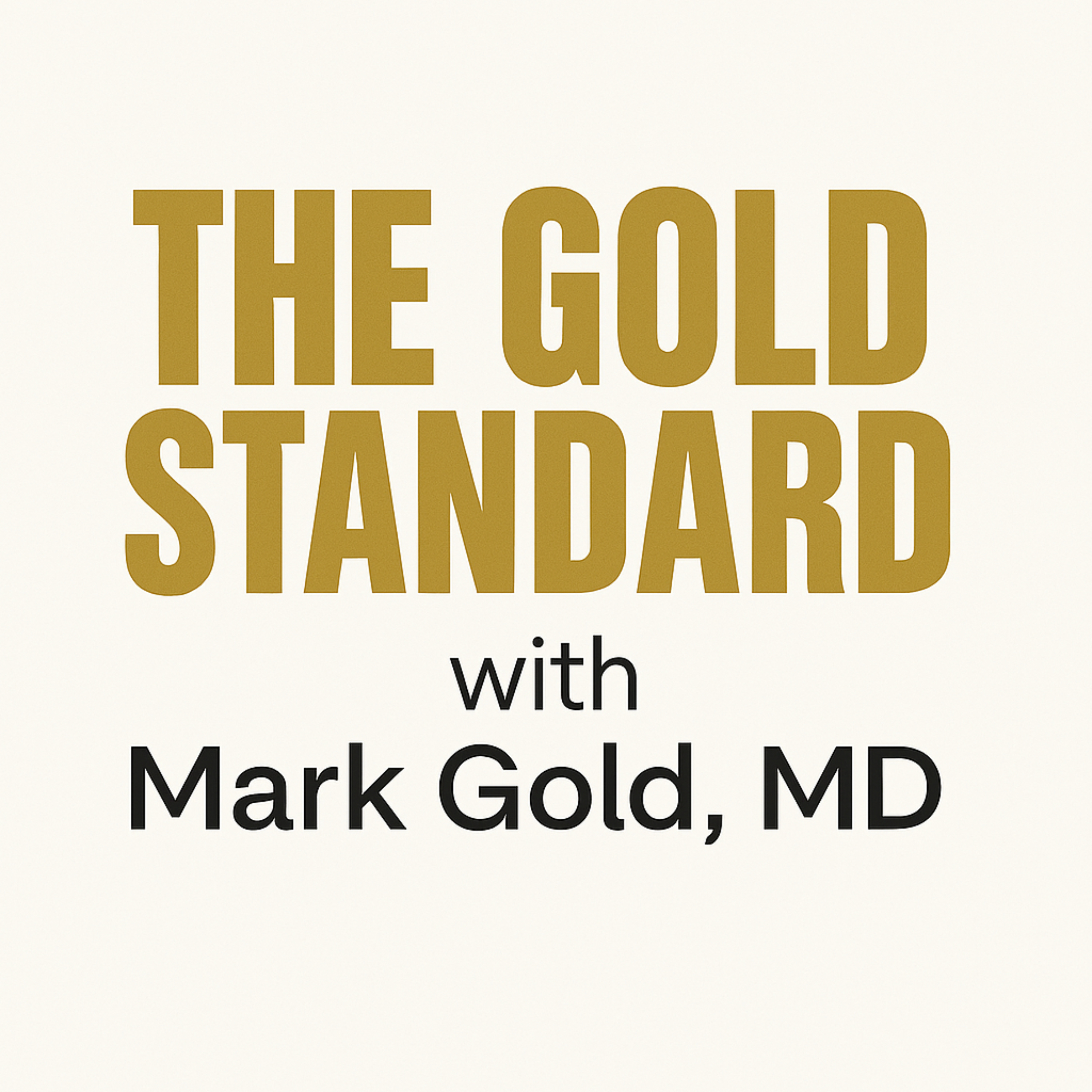The Gold Standard with Mark S. Gold, MD

The Gold Standard with Mark S. Gold, MD
Podcast Description
Join renowned psychiatrist and addiction expert Dr. Mark S. Gold as he hosts THE GOLD STANDARD, an insightful and dynamic video series featuring in-depth interviews with the world’s leading experts in psychiatry, addiction medicine, and cutting-edge healthcare. In each episode, Dr. Gold taps into the minds of thought leaders, groundbreaking researchers, and clinical pioneers, delving into the most pressing issues facing mental health and addiction treatment today.
Podcast Insights
Content Themes
The show focuses on mental health and addiction treatment, addressing essential topics like addiction medicine's evolution, the public health implications of cannabis use, and culturally informed mental health care, exemplified by episodes such as 'Addiction Medicine: From the Summer of Love to the Fentanyl Crisis' and 'Culturally Informed Mental Health Care.'

Join renowned psychiatrist and addiction expert Dr. Mark S. Gold as he hosts THE GOLD STANDARD, an insightful and dynamic video series featuring in-depth interviews with the world’s leading experts in psychiatry, addiction medicine, and cutting-edge healthcare. In each episode, Dr. Gold taps into the minds of thought leaders, groundbreaking researchers, and clinical pioneers, delving into the most pressing issues facing mental health and addiction treatment today.
This episode is a must-listen for anyone interested in the past, present, and future of psychiatry, neuropharmacology, trauma research, and the integration of cutting-edge science with compassionate clinical care.
Dr. Nemeroff is the Matthew P. Nemeroff Endowed Chair at the University of Texas at Austin Dell Medical School, director of the Institute for Early Life Adversity Research, co-director of the Psychedelic Research and Therapy Center, and a professor with a remarkable impact on psychiatric research both nationally and globally.
In this deep dive, Drs. Gold and Nemeroff explore the influential career of Dr. Nemeroff, who is recognized as the most cited psychiatric researcher in the United States, and among the top in biological psychiatry, childhood trauma, and mood disorders.
They discuss how his journey, beginning humbly as a lab tech in Brooklyn, was profoundly shaped by mentorship and innovative thinking, propelling him through master’s, PhD, and MD programs to become a pioneer in neuropsychopharmacology and trauma research.
Listeners will gain invaluable insights into the genesis of Nemeroff’s groundbreaking work on the long-term effects of childhood trauma—a field once dismissed by peers as “preposterous” but now recognized as critical in understanding psychiatric illness and longevity, with child abuse identified as a more significant factor than smoking.
The dialogue captures the persistence required to challenge orthodox thinking and launch an entire research domain that now informs public health and policy.The episode also highlights Dr. Nemeroff’s role in building influential psychiatry programs, including Emory University and currently at the University of Texas, where he chairs the Texas Child Trauma Research Network.
Supported by substantial state funding, this network tracks thousands of trauma-exposed children to identify predictors of mental health trajectories, demonstrating the powerful intersection of research, clinical care, and legislative advocacy.
A significant portion of the conversation is dedicated to the evolving landscape of psychiatric treatment, including the promise and challenges of psychedelics, ketamine, and neuromodulation technologies such as transcranial magnetic stimulation (TMS) and focused ultrasound.
Dr. Nemeroff offers a balanced, evidence-based perspective on these emerging therapies, emphasizing the need for rigorous clinical trials amid the hype surrounding psychedelics like psilocybin and LSD. He stresses that while psychedelic treatments show rapid and lasting effects for treatment-resistant depression, concerns about safety, dosing variability, and the current unregulated market remain major issues.
The dialogue delves into the complexities of psychiatric diagnoses, highlighting a comprehensive diagnostic program where complex cases are evaluated by multidisciplinary teams to correct misdiagnoses—such as distinguishing bipolar disorder from autism spectrum conditions—and uncover underlying medical causes of psychiatric symptoms.
The conversation paints a vivid picture of academic lineage, collaboration, and the importance of fostering the next generation of scientists and clinicians.Drs. Gold and Nemeroff also touch on pressing issues in addiction psychiatry, discussing the lack of effective treatments for stimulant use disorders and the potential role psychedelics might play in resetting brain function.
The conversation concludes on an optimistic note about the future of psychiatry, with artificial intelligence poised to transform personalized medicine by integrating polygenic risk scores and multifactorial data to predict treatment responses.
Dr. Charles Nemeroff’s journey exemplifies the power of mentorship, persistence, and scientific rigor to challenge conventions and improve mental health outcomes worldwide.
**Listen, learn, and join the conversation on the future of psychiatry with Drs. Mark Gold and Charles Nemeroff on The Gold Standard.**

Disclaimer
This podcast’s information is provided for general reference and was obtained from publicly accessible sources. The Podcast Collaborative neither produces nor verifies the content, accuracy, or suitability of this podcast. Views and opinions belong solely to the podcast creators and guests.
For a complete disclaimer, please see our Full Disclaimer on the archive page. The Podcast Collaborative bears no responsibility for the podcast’s themes, language, or overall content. Listener discretion is advised. Read our Terms of Use and Privacy Policy for more details.